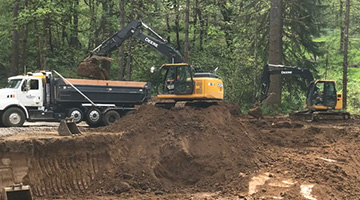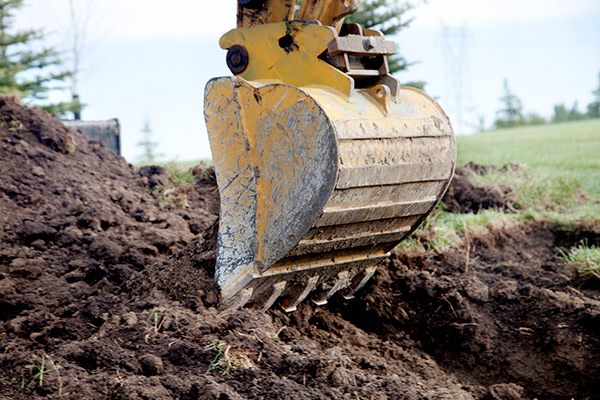Economical Lancaster Excavation - High Quality Excavation at Competitive Costs
Wiki Article
Comprehensive Excavation Strategies: Mastering the Fundamentals for Success
In the realm of building and civil design, the significance of efficient excavation strategies can not be overstated. The cautious preparation, exact execution, and careful focus to information called for in excavation projects demand a detailed strategy that encompasses numerous basic aspects. From preliminary soil evaluation to the implementation of safety measures and regular development surveillance, grasping these core components is important for accomplishing success in any type of excavation venture. Nevertheless, the real proficiency exists not simply in comprehending these principles yet in seamlessly incorporating them to browse the intricacies of excavation projects with finesse.Comprehending Excavation Job Planning

Effective excavation tasks are constructed on the foundation of thorough and careful planning. The first phase of any type of excavation task is the planning phase, where essential choices are made that can dramatically affect the end result of the task. During this phase, it is important to collect all pertinent details about the website, including topographical surveys, dirt make-up, and any type of possible hazards that may exist. Recognizing the job timeline, budget plan, and extent constraints is vital for developing a comprehensive excavation plan that guarantees the task's success.
One key facet of excavation task preparation is the development of a detailed timeline that outlines the series of target dates, turning points, and activities. This timeline acts as a roadmap for the task team, permitting them to track progression and make needed adjustments to ensure the task remains on routine. In addition, a well-defined budget plan that represents all expenses, consisting of equipment rental, labor prices, and products, is necessary for preventing price overruns and delays. By thoroughly considering all these variables during the drawing board, excavation tasks can be performed successfully and efficiently, bring about successful outcomes.
Soil Analysis and Website Analysis
Performing thorough dirt evaluation and website evaluation is a vital action in the preparation phase of any excavation job. Soil analysis entails determining the structure, structure, and buildings of the dirt at the excavation website. This info is vital for recognizing the soil's bearing ability, dampness web content, and possibility for disintegration, which are vital variables in determining the excavation methods and equipment needed for the project.Site examination surpasses soil analysis and encompasses a wider analysis of the total website problems. This examination includes recognizing any kind of possible dangers, such as below ground utilities, environmental issues, or unsteady terrain, that could influence the excavation procedure. By completely reviewing the website, job managers can develop reliable excavation strategies that focus on safety and security, effectiveness, and environmental management.
Making use of advanced modern technologies like ground-penetrating radar, soil sampling, and drone studies can improve the accuracy and efficiency of dirt evaluation and site analysis. Spending time and resources in these preliminary actions can eventually save time and protect against pricey hold-ups or problems throughout the excavation process.
Tools Option and Use
Effective excavation jobs count heavily on tactical tools choice and usage to ensure optimum efficiency and efficiency. Selecting the ideal equipment for the task is essential in making best use of effectiveness and decreasing downtime. Elements such as the kind of soil, depth of excavation, and project range play a substantial function in establishing the most ideal equipment for the job handy.
In addition to selecting the suitable equipment, appropriate application is vital to task success. Operators has to be educated to deal with the devices safely and efficiently - lancaster trenching. Routine maintenance checks and prompt repair services aid stop malfunctions and guarantee consistent performance throughout the task
Precaution and Laws Compliance
In the world of excavation projects, prioritizing safety actions and compliance with regulations is paramount to making sure a legitimately sound and safe functional lancaster excavation atmosphere. Safety actions include a series of methods, including conducting thorough website assessments, applying correct signs and barriers, and giving sufficient safety and security training for all workers included in the excavation process. Adherence to guidelines, such as OSHA requirements in the USA, ensures that the excavation task satisfies the needed standards to shield workers, spectators, and the surrounding environment.Surveillance Development and Adjusting Strategies
Exactly how can predict managers successfully track the advancement of excavation projects and adjust their approaches appropriately to optimize outcomes? Tracking progression is important for making sure that excavation projects remain on track and meet target dates.
Final Thought
In verdict, grasping the basics of comprehensive excavation methods is vital for the success of any job. By understanding job planning, examining soil and website conditions, choosing ideal tools, abiding by safety guidelines, and keeping track of progression, project supervisors can guarantee a efficient and smooth excavation procedure. Implementing these methods will certainly bring about successful end results and minimize prospective dangers or setbacks during the excavation project.
The first phase of any kind of excavation task is the planning phase, where vital choices are made that can considerably affect the result of the project. Comprehending the task scope, timeline, and budget restraints is essential for producing a thorough excavation strategy that ensures the project's success.
Exactly how can predict supervisors properly track the development of excavation jobs and adapt their techniques appropriately to enhance end results? By very closely checking progression and being willing to adjust approaches, task supervisors can boost the total success of excavation tasks.
By recognizing job preparation, examining dirt and site conditions, selecting proper devices, complying with security policies, and keeping track of development, task managers can make certain a smooth and efficient excavation procedure.
Report this wiki page